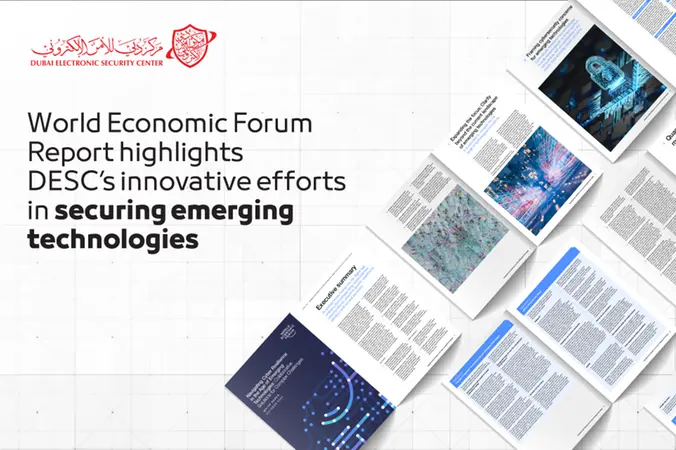PHOTO
- It showcases the Dubai Electronic Security Center’s (DESC) contributions to Dubai’s strategic goals related to emerging and modern technologies
Dubai, UAE: The World Economic Forum, in a recent study, highlighted the Dubai Electronic Security Center’s (DESC) contributions to Dubai’s leading model in securing emerging technologies, integrating them into the digital infrastructure, and safely deploying them across various economic sectors.
The study, titled “Navigating Cyber Resilience in the Age of Emerging Technologies,” highlighted Dubai’s achievements in employing emerging technologies such as artificial intelligence, blockchain, quantum computing, and smart cities in sectors like government services, communications, manufacturing, transport, and urban planning. These achievements align with the nation’s vision to foster innovation, resilience, and reliability in the digital infrastructure, supported by an integrated system of specialized government entities, led by the Dubai Electronic Security Center (DESC).
The study noted that the Dubai Cyber Security Strategy, overseen by DESC, plays a pivotal role in stimulating innovation and ensuring the security of digital assets. It also mentioned that the UAE has reinforced its leadership in this field through national strategies such as the UAE National Strategy for Artificial Intelligence 2031, alongside significant investments in developing emerging and advanced technologies, including quantum computing, 5G communications, the Internet of Things, and autonomous smart mobility. Additionally, partnerships with research institutions and stakeholders from both the public and private sectors, locally and globally, have been established to create regulatory frameworks that ensure the safe adoption of emerging technologies.
The study highlighted the policies launched by DESC, including the Dubai AI Security Policy, the world's first autonomous vehicle security specification, and the RZAM cybersecurity application, which protects internet users from malicious browsing and phishing sites in real-time using AI technologies.
His Excellency Yousuf Hamad Al Shaibani, CEO of DESC, said: "The Center’s contributions to securing emerging technologies align with its vision to make Dubai digitally the safest city in the world. Therefore, the Center continues to coordinate with governmental, regional, and international entities to study the security requirements of modern and emerging technologies and set standards and controls that ensure their safe adoption across various sectors."
Recently, the Dubai Electronic Security Center released a study on connected vehicles, one of the Internet of Things applications in the transport sector, discussing the necessary security specifications and requirements for these vehicles. This further supports the implementation of Dubai’s Self-Driving Transport (SDT) Strategy, which aims to transform 25% of Dubai’s total transportation to self-driving vehicles by 2030.
Given the expectations that AI's contribution to the UAE's economy will grow to USD 320 billion by 2030, DESC issued a detailed study on the opportunities to leverage AI technologies across various sectors in Dubai. The study provided an analysis of the current capabilities of these technologies, estimated their economic contribution to the emirate's growth, discussed societal and ethical considerations, and the risks associated with their widespread adoption. It also explored ways to enhance collaboration among stakeholders in Dubai's AI landscape.
For more information on the World Economic Forum’s “Navigating Cyber Resilience in the Age of Emerging Technologies” study, please visit the following link.




















